A Chiara explores a teenager’s discovery of unexpected—and universal—adult truths
Writer-director Jonas Carpignano maintains a dispassionate distance in this look at a young woman's realization of her family's dangerous ties
Film Reviews A Chiara
A common experience while growing up is realizing that one’s parents are not quite the monoliths one imagined them to be as a child. Adolescence is a process of acclimating one’s internal perceptions to the realities of the world around them, and a time comes in almost everyone’s life when they discover that not all families are like their own. This is the reality that writer-director Jonas Carpignano explores in A Chiara, the third film in his informal trilogy of films set in the Calabrian region of Italy. Observing his own story from a dispassionate distance, Carpignano tracks a teenage girl’s evolving betrayal as her sense of reality collapses around her in a film that proves affecting, albeit inconsistently.
The titular Chiara Guerrasio (Swamy Rotolo) is a 15-year-old in a well-to-do family, patriarchally led by her father Claudio (Claudio Rotolo). Following a bombastic celebration of Chiara’s sister Giulia’s (Grecia Rotolo) 18th birthday, Chiara witnesses the explosion of the family car, after which Claudio is nowhere to be found. Though her mother Carmela (Carmela Fumo) is determined to act as though nothing out of the ordinary is happening, Chiara quickly discovers the news is reporting that her father is a fugitive with connections to the mafia, driving Chiara to a crisis of faith in her parents and outrage that threatens her role in their domestic happiness.
Cinematographer Tim Curtin does an excellent job of complementing Chiara’s escalating sense of betrayal through a camera that remains committed to capturing her emotional state, restrained enough to retain a strictly observational distance, but intimate enough that we are connected to her journey even when communicated with a muted expression. Carpignano’s choice to cast A Chiara with non-professional actors—primarily members of the Rotolo family—allows for a lived-in naturalism with his characters, albeit through performances that linger without compelling dramatic flourish. Consequently, the film draws upon the dynamics of a real family to examine a fundamental gap between the harmony of domestic life and the forbidden fruit of ill-gotten gains, all without feeling staged or crafted by external storytelling conceits.
Chiara is constantly treated as a child with the inability to understand exactly who her father is and the dangers she poses to him by inquiring into his business and disappearance. Her mother and sister repeatedly tell her that she is incapable of understanding, but they refuse to speak to the reality of their patriarch’s criminal lifestyle because it exposes their willful ignorance or knowing complicity. This growing gulf between Chiara and her family leaves her isolated in her search for truth, as emblematized by her recurring trips to the gym to run the treadmill alone, forever in pursuit, yet trapped in an artifice from which she can’t break free.
Unfortunately, the stylistic choice to follow Chiara’s story at an arm’s length distance from the moral judgment of her family adversely impacts the film’s tone and pacing. Most particularly, the protracted examination of Chiara’s feelings of normalcy serve as an effective juxtaposition for her emotional development in the lead-up to her revelatory quest for answers, but proves overly passive in examining the family dynamic for an extended period of time. The film’s commitment to the mere observation of its performers, instead of calculatingly framing them, gives A Chiara a looseness that allows the mind to wander just as much as it invites contemplation, a problem that tightens as Chiara’s circumstances and dilemmas become more concrete but remains persistent throughout.
Notably, A Chiara’s plotting is at its tightest and most compelling in its climax and epilogue, where the results of Chiara’s moral dilemma come to a head and Carpignano converts unspoken turmoil into explicit text, a narrative tactic that solidifies a heartbreaking narrative in danger of spinning out into nihilism. In observing that space between childhood and adulthood, A Chiara contemplates a character who is forced to grow up too fast, acknowledging the cost of family secrets and weighing the consequences of upholding a status quo that obscures reality. Though the path to its conclusions is at times more plodding than meditative, the finale is a subtle, emotional twist of the knife that makes the journey worth taking.